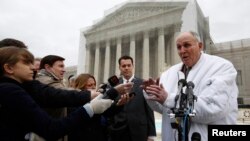The seeds of patented plants are patented, too, and replanting them violates intellectual property law. That’s the ruling from the U.S. Supreme Court. The court decided a case that pitted the seed company Monsanto against a farmer who saved the offspring of plants grown from the company’s genetically modified seeds. Intellectual property rights supporters call it a victory.
Several years ago, Indiana farmer Vernon Hugh Bowman needed seed for a risky late planting of his soybean crop, says his attorney, Mark Walters.
“Farmers used to save their seeds from their first crop soybeans from the previous year and use those for second-crop planting after wheat. But that is no longer available as an option because most farmers signed agreements saying they won’t do that," he said.
Monsanto and other companies require these agreements in order to protect the technologies the seed makers spent millions of dollars to develop: Technologies like a genetic trait that makes the plants immune to Monsanto’s weed killer Roundup, which makes weed control much easier. More than 90 percent of the soybeans grown in the U.S. contain the “Roundup-Ready” trait.
Looking to save money on his risky second crop, Bowman bought soybeans from the local grain storage facility, knowing almost all would be Roundup Ready. He planted them, sprayed them with Roundup, and saved seeds from the survivors.
“That planting, the farmer contended, was beyond the control of Monsanto," said Jim Crowne, head of legal affairs at the American Intellectual Property Law Association. The group supported Monsanto in the case. He says Bowman was relying on a legal doctrine known as patent exhaustion. It states that the patent holder gives up the rights to a product once the product is sold.
“Monsanto sold to a farmer, the farmer grew the seeds, the farmer sold the seed again to the grain elevator. So, there had been these intervening transactions," he said.
But in the unanimous Supreme Court decision, Justice Elena Kagan wrote: “The exhaustion doctrine does not enable Bowman to make additional patented soybeans without Monsanto’s permission … And that is precisely what Bowman did.”
In other words, Jim Crowne says, it’s fine to buy the seeds, plant them, grow your crop and sell it.
“It’s not perfectly fine for you to take that seed, replant it, produce endless iterations of this patented product, essentially allowing you to avoid going back to Monsanto," he said.
Monsanto spokesman Lee Quarles says it’s a key ruling for innovation in agriculture.
“Agricultural technologies are possible only with huge R&D investments and the patent laws that make the investment economically feasible," he said.
But Bowman’s lawyer Mark Walters says the ruling puts too much control in the hands of a few seed companies. Walters says it’s impossible for his client to find seeds in his area that are not patented.
“He’s been driving several hundred miles into Ohio to find what he says is the last available public seed source that’s not patented," he said.
While the court has settled this issue of patent protection for seeds, debate continues on the pros and cons of patented seeds for food production and farmers' welfare.





